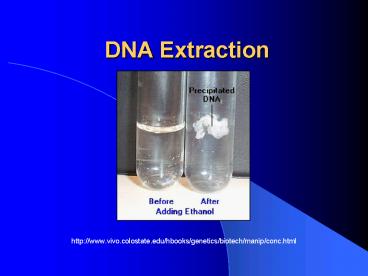DNA Extraction - PowerPoint PPT Presentation
1 / 15
Title:
DNA Extraction
Description:
Elution of DNA. DNA is released from column. and ready for use in downstream applications. ... Help suspend DNA in elution buffer. END. Resources. DNA ... – PowerPoint PPT presentation
Number of Views:631
Avg rating:3.0/5.0
Title: DNA Extraction
1
DNA Extraction
- http//www.vivo.colostate.edu/hbooks/genetics/biot
ech/manip/conc.html
2
Definition
- DNA Extraction is the isolation and purification
of DNA (deoxyribonucleic acid) - http//academy.d20.co.edu/kadets/
- lundberg/images/dna.gif
3
Examples
- DNA extraction is used to isolate
- Mitochondrial DNA
- Genomic DNA
- DNA can be extracted from
- Cells or tissues
- Environmental samples
http//www.davidkfaux.org/shetlandislandsmtDNA.htm
l
http//faculty.uca.edu/benw/biol1400/pictures/
4
Non-examples
- DNA Extraction is not used to
- Isolate proteins or RNA
- Give information about gene expression
http//iwrwww1.fzk.de/biostruct/
5
Downstream Applications
- After DNA is extracted, it is used as a template
in further molecular techniques such as - PCR (polymerase chain reaction)
- RFLP (restriction fragment length polymorphism)
- Southern Blotting
6
DNA Analysis
- Downstream techniques can
- Reveal how organisms are related
- Identify cryptic species
- Locate mutations in DNA
http//www.biocompare.com/itemdetails.asp?itemid6
87320
http//www.cdc.gov/hemochromatosis/training/images
/dna.jpg
7
Quick Quiz
- What is the purpose of DNA extraction?
- a. To learn how to safely work with chemicals
- b. To quantify the amount of DNA per cell
- c. To determine how organisms are related
- d. To purify DNA from cells
8
Qiagen DNA Extraction
Tissue Lysis. Detergents lyse membranes.
Proteinase K breaks down proteins.
Sample loading onto column. Nucleic acids bind
to membrane and other components flow through.
Column washing. Removes any contaminants.
Elution of DNA. DNA is released from column and
ready for use in downstream applications.
9
Quick Quiz
- The purpose of the column is to
- a. Separate DNA from RNA
- b. Separate DNA molecules from cellular debris
- c. Remove bacterial contaminants
- d. Help suspend DNA in elution buffer
10
- END
11
Resources
- DNA Extraction Handout
- DNEasy Tissue Kit Handbook
- http//www1.qiagen.com/literature/protocols/
DNeasyTissue.aspx
12
California State Chemistry Standards
- Grade 8
- 6c. Living organisms have many different kinds
of molecules - Grades 9-12
- 6. Solutions are homogenous mixtures of two or
more substances - 7. Energy is exchanged or transformed in all
chemical reactions and physical changes of matter - 8. Chemical reaction rates depend on factors that
influence the frequency of collision of reactant
molecules
13
California State Biology Standards
- Grade 7
- 2e. DNA is the genetic material of living
organisms and is located in the chromosomes of
each cell - 3a. Genetic variation and environmental factors
are causes of evolution and diversity of
organisms - Grades 9-12
- 2. Mutation and sexual reproduction lead to
genetic variation in a population - 7. The frequency of an allele in a gene pool of
a population depends on many factors and may be
stable or unstable over time
14
California State Investigation and
ExperimentationStandards
- Grades 7, 9-12
- a/b. Select and use appropriate tools and
technology to perform tests, collect data,
analyze relationships, and display data - Grade 8
- a. Plan and conduct a scientific investigation
to test a hypothesis
15
National Standards
- Grades 6-12
- Content Standard A Science as Inquiry
- Content Standard C Life Science
- Content Standard E Science and Technology































